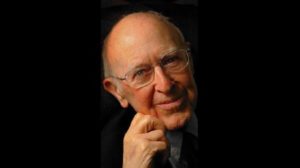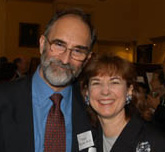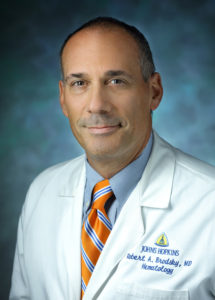 JAMES E.T. HOPKINS, great-great-nephew of Johns Hopkins, is a 1941 alumnus of the School of Medicine and a 1937 graduate of what is now the university’s Krieger School of Arts and Sciences. Born and raised in Maryland, Dr. Hopkins left his surgical practice at Hopkins Hospital in 1942 to volunteer for military duty in the Army Medical Corps. He served in the Pacific before volunteering for a dangerous and hazardous mission at the request of President Roosevelt. His unit, known as Merrill’s Marauders, worked with the Chinese infantry in India to reopen the Burma Road. Unarmed, Dr. Hopkins provided medical care to the wounded behind enemy lines for seven months. His outstanding conduct while in combat earned Dr. Hopkins an induction in the Ranger Hall of Fame. Dr. Hopkins was also honored with the Bronze Star, Presidential Unit Citation, and numerous other awards.
JAMES E.T. HOPKINS, great-great-nephew of Johns Hopkins, is a 1941 alumnus of the School of Medicine and a 1937 graduate of what is now the university’s Krieger School of Arts and Sciences. Born and raised in Maryland, Dr. Hopkins left his surgical practice at Hopkins Hospital in 1942 to volunteer for military duty in the Army Medical Corps. He served in the Pacific before volunteering for a dangerous and hazardous mission at the request of President Roosevelt. His unit, known as Merrill’s Marauders, worked with the Chinese infantry in India to reopen the Burma Road. Unarmed, Dr. Hopkins provided medical care to the wounded behind enemy lines for seven months. His outstanding conduct while in combat earned Dr. Hopkins an induction in the Ranger Hall of Fame. Dr. Hopkins was also honored with the Bronze Star, Presidential Unit Citation, and numerous other awards.
After serving in World War II, Dr. Hopkins worked at Walter Reed, Johns Hopkins, and McGuire Veterans hospitals before launching his own thoracic surgery practice in Baltimore. He authored Spearhead: The Complete History of Merrill’s Marauder Rangers and worked with the War Department to improve combat helmets and to develop the lightweight combat vest. Dr. Hopkins retired from private practice in 1989 and resides in Roland Park with his wife, Mary Margaret Hopkins.

A native of New Jersey, JANIE ELIZABETH (Liza) BAILEY is the great-great-great niece of Johns Hopkins. She graduated from the Garrison Forest School, near Baltimore, Maryland, and Georgetown University’s School of Foreign Service. After completing her education, Ms. Bailey worked on Wall Street for 30 years, of which the last 20 were spent with Credit Suisse First Boston doing mergers and acquisitions. From 1997 until her retirement in 2004, she co-headed the Consumer Investment Banking Group of CSFB’s Investment Banking Division. She lives in New York with her husband, Michael Musgrave, and is co-founder of GlobeVest Partners, LLC, a private equity international fund of funds. She currently serves on the board of the YMCA of Greater New York.
MICHAEL MUSGRAVE, PhD, is a native of London and a graduate of the Royal College of Music and Kings College, University of London, where he received his doctoral degree. He retired after 30 years with the University of London in 1997 as Professor Emeritus. He currently serves on the faculty of the Juilliard School and was recently named as an honorary Fellow of the Royal College of Music. Dr. Musgrave is a leading authority on German music of the 19th and early 20th centuries and has authored and edited eight books on Brahms and related subjects. Dr. Musgrave is the father of two sons who live in London.
 Dr. ROBERT BRODSKY is a professor of medicine at the Johns Hopkins University School of Medicine. His area of clinical expertise is hematology. Through research, he and his colleagues have pioneered the use of high-dose cyclophosphamide therapy for the treatment of aplastic anemia and other autoimmune conditions.
Dr. ROBERT BRODSKY is a professor of medicine at the Johns Hopkins University School of Medicine. His area of clinical expertise is hematology. Through research, he and his colleagues have pioneered the use of high-dose cyclophosphamide therapy for the treatment of aplastic anemia and other autoimmune conditions.